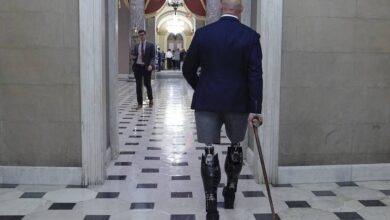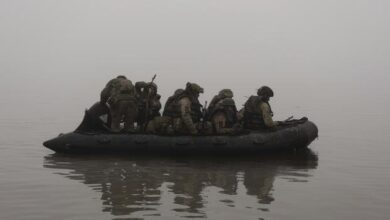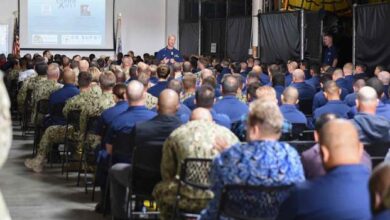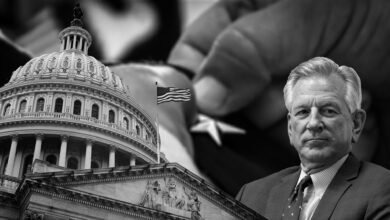How I Got Here: This service member and entrepreneur centers communication in everything she does

Neferteri Strickland’s military roots are so deep that she had a pilot’s license before getting her driver’s license in high school.
Strickland is a King of Prussia-based part-time service member, specifically a captain in the Pennsylvania Army National Guard. Both of her parents were service members, too, and she spent most of her childhood on military bases. She joined the military magnet program Junior ROTC as a teenager, and when she was 17, she joined the National Guard.
But service member isn’t the only hat that Strickland wears: She is also the founder of education consulting company Teachers &. She started the company in 2020 when she, a parent, realized that it’s not enough to just advocate for your own child if you want to see change — she wanted to advocate for other children in the education system.
The third hat that Strickland wears is blockchain technology lecturer at Saint Joseph’s University and persuasive communications and entrepreneurship lecturer at the Wharton School of Business. Outside of her day jobs, she is also one of the Philadelphia chapter ambassadors for Bunker Labs, an organization that supports veterans and service members who are also entrepreneurs.
Strickland, 44, has a bachelor’s degree in radio and television mass communication, a master’s degree in information assurance and cybersecurity, and a higher education teaching certificate. She told Technical.ly she doesn’t like to view her career as linear, and the common threads through all of her roles are communication and bringing people together.
Here’s a look at how Strickland thinks about all of her roles and how she brings them together. This Q&A has been edited for length and clarity.
What is it like to balance all the different aspects of your career?
Neferteri Strickland: Never a dull moment. Often it feels like you’re demobilizing once a month because there’s this ramp up to the drill weekend [when Army National Guard members report for training] that you go through. Then you go and you actually drill and then you go home and take the uniform off. Usually that ends up being like a 10-day work week before you get any type of break. You’ll work Monday through Friday, then you’ve got to drill. And then when it’s over, you come home and you go back to work again.
Why did you start a business?
Like so many others, out of necessity. Wanting to see something different in the world and not finding it and so, starting it yourself. Teachers& is the name of the education consultancy. We believe that Pennsylvania deserves a world-class, Pennsylvania-educated workforce.
I’ve been fortunate enough through the military as a communications officer [to] have always been immersed in technology and communications equipment, satellite, regular terrestrial radio communications, and understanding how that sender sends a message to the receiver. And then on the other end of that, there’s action. Through that command and control, you can affect change whether it’s for military or civilian purposes, right? So when you think about all types of emerging technology, you have those protocols.
… For me, I’m thinking about all the students, all the teachers who, just basic communications theory is not a part of their foundational understanding. So I’ve brought it all the way back or appealed it all the way back to K-12 education. Can we provide a strong foundation in technical understanding that we can start to build technical capability, emerging technology on top of that.
How did you get involved in Bunker Labs? Why are you interested in supporting veteran entrepreneurs?
I started out as a member of the veterans in residence program, where I was a VIR, and a cohort member. After one cohort, I was invited to become an ambassador and accepted that invitation. And so for the last three cohorts, I’ve been mentoring veteran-focused entrepreneurs, service-connected entrepreneurs or veteran entrepreneurs. I’ve been mentoring them [about] starting and growing their business.
I am passionate about it because Philly has been really supportive of my work, inviting of my work, but it hasn’t been because I’m a veteran. And so through social capital through the use of social capital, I’ve been working with veteran entrepreneurs to extend that support and that invitation.
There are any number of challenges, problems that these entrepreneurs have set out to solve through products and services. Service members have experience and they’re highly experienced operationally. But it’s usually under the flag of an organization that exists, long-standing organizations. And so, how do they cross the bridge with this knowledge and this experience without losing the momentum of their career, right? And it’s because of the support of their organization that they’ve been so successful, whether that’s personnel, equipment, or resources, financial resources, and so if we can find a bridge, so we can capture that experience, and help them solve that problem through product or service, Philly will win. But we’ve got to help them develop a team that helps them maintain that high-operational capability.
How does your experience as a service member translate to your work as an entrepreneur?
The things that transfer are organizational skills, attention to detail, taking risks, communicating,
being able to paint a picture, communicating to an audience with a set of slides, or a slide deck. The things that are different are the integrity of structured organization, and protocol. There’s protocol in the general economy, but it’s nuanced. It’s not explicit what the rules are — the rules of engagement. You’ll find that you’ll come in contact with people in organizations that are not as transparent about how to work with them. And so it leaves you having to, through trial and error, understand the rules of engagement.
What is a proud moment you’ve had in your career?
I find the most joy working with students, whether they are undergraduate or graduate students, or MBA candidates. To be able to introduce a concept to them, work through some scenarios, and then watch them, hear them, take ownership of that information as their own and apply it in context to how they see it in the world being applied in a business scenario or in the education sector is powerful.
What is one of the biggest challenges you’ve faced in your career?
[The] biggest challenges I’ve faced in my career is the pace and complexity at which technology is advancing. Cybersecurity is a domain in which I’ve been a practitioner of, and I have watched artificial intelligence be introduced into this space. And so this isn’t like a previously overcome challenge. This is a real-time challenge of the day. At this juncture, I’m working to understand how AI is being applied in the defense space for cybersecurity. And that’s a real-time, evolving use case.
The theme of communication seems to run through every aspect of your career. Why does that interest you?
The soft skill that we want kids to learn is communication. At 17 years old, I enlisted in the Georgia Army National Guard as a communicator. The branch, military proper title is “signal,” but it’s communication. I was a computer systems analyst, 74 bravo was the designation, so very early, receiving that formal training. And now as a communications officer, again, [I’ve received] formal training in how to plan, establish, maintain and defend communications networks. So the way that my brain processes social organization, the sender, receiver, mode and message — that’s the way it works.
What goals do you have for your career going forward?
I definitely am focused on understanding how emerging technologies will settle into the best practices of basic service providers and how emerging technology under what we might call the fourth industrial revolution change the way that we live, work and play. When augmented reality is fully deployed, what does that look like in school? What does that look like in the physical places we shop? Malls might not even exist anymore. What does that look like? And not just at the end user interface, but what does it look like under the hood? What does the network look like? And what does the security of that network look like?
It’s really early in that transition, still. And so what’s next for me is to understand how the bridge builders and the gap fillers fit into the digital transformation from where we are to where we’re going.
Sarah Huffman is a 2022-2023 corps member for Report for America, an initiative of The Groundtruth Project that pairs young journalists with local newsrooms. This position is supported by the Lenfest Institute for Journalism.
Subscribe
Knowledge is power!
Subscribe for free today and stay up to date with news and tips you need to grow your career and connect with our vibrant tech community.
Technically Media





